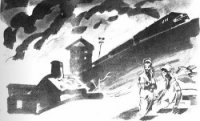Watership Down - Adams Richard George (книги полностью бесплатно .txt) 📗
"It's moving away," said Hazel.
"How many field mice say that every night, I wonder? You know the call's deceptive. It's meant to be."
"Well, I can't help it," said Hazel. "Fiver's somewhere out there and I'm going after him. You were right, anyway. It is light-just."
"Shall we look under the yew tree first?"
But Fiver was not under the yew tree. The light, as it grew, began to show the upper field, while the distant hedge and brook remained dark, linear shapes below. Bigwig jumped down from the bank into the field and ran in a long curve across the wet grass. He stopped almost opposite the hole by which they had come up, and Hazel joined him.
"Here's his line, all right," said Bigwig. "Fresh, too. From the hole straight down toward the brook. He won't be far away."
When raindrops are lying it is easy to see where grass has recently been crossed. They followed the line down the field and reached the hedge beside the carrot ground and the source of the brook. Bigwig had been right when he said the line was fresh. As soon as they had come through the hedge they saw Fiver. He was feeding, alone. A few fragments of carrot were still lying about near the spring, but he had left these untouched and was eating the grass not far from the gnarled crab-apple tree. They approached and he looked up.
Hazel said nothing and began to feed beside him. He was now regretting that he had brought Bigwig. In the darkness before morning and the first shock of discovering that Fiver was gone, Bigwig had been a comfort and a stand-by. But now, as he saw Fiver, small and familiar, incapable of hurting anyone or of concealing what he felt, trembling in the wet grass, either from fear or from cold, his anger melted away. He felt only sorry for him and sure that, if they could stay alone together for a while, Fiver would come round to an easier state of mind. But it was probably too late to persuade Bigwig to be gentle: he could only hope for the best.
Contrary to his fears, however, Bigwig remained as silent as himself. Evidently he had been expecting Hazel to speak first and was somewhat at a loss. For some time all three moved on quietly over the grass, while the shadows grew stronger and the wood pigeons clattered among the distant trees. Hazel was beginning to feel that all would be well and that Bigwig had more sense than he had given him credit for, when Fiver sat up on his hind legs, cleaned his face with his paws and then, for the first time, looked directly at him.
"I'm going now," he said. "I feel very sad. I'd like to wish you well, Hazel, but there's no good to wish you in this place. So just goodbye."
"But where are you going, Fiver?"
"Away. To the hills, if I can get there."
"By yourself, alone? You can't. You'd die."
"You wouldn't have a hope, old chap," said Bigwig. "Something would get you before ni-Frith."
"No," said Fiver very quietly. "You are closer to death than I."
"Are you trying to frighten me, you miserable little lump of chattering chickweed?" cried Bigwig. "I've a good mind-"
"Wait, Bigwig," said Hazel. "Don't speak roughly to him."
"Why, you said yourself-" began Bigwig.
"I know. But I feel differently now. I'm sorry, Bigwig. I was going to ask you to help me to make him come back to the warren. But now-well, I've always found that there was something in what Fiver had to say. For the last two days I've refused to listen to him and I still think he's out of his senses. But I haven't the heart to drive him back to the warren. I really believe that for some reason or other the place is frightening him out of his wits. I'll go with him a little way and perhaps we can talk. I can't ask you to risk it, too. Anyway, the others ought to know what we're doing and they won't unless you go and tell them. I'll be back before ni-Frith. I hope we both shall."
Bigwig stared. Then he turned furiously on Fiver. "You wretched little black beetle," he said. "You've never learned to obey orders, have you? It's me, me, me all the time. 'Oh, I've got a funny feeling in my toe, so we must all go and stand on our heads! And now we've found a fine warren and got into it without even having to fight, you've got to do your best to upset everyone! And then you risk the life of one of the best rabbits we've got, just to play nursey while you go wandering about like a moonstruck field mouse. Well, I'm finished with you, I'll tell you plain. And now I'm going back to the warren to make sure everyone else is finished with you as well. And they will be-don't make any mistake about that."
He turned and dashed back through the nearest gap in the hedge. On the instant, a fearful commotion began on the farther side. There were sounds of kicking and plunging. A stick flew into the air. Then a flat, wet clod of dead leaves shot clean through the gap and landed clear of the hedge, close to Hazel. The brambles thrashed up and down. Hazel and Fiver stared at each other, both fighting against the impulse to run. What enemy was at work on the other side of the hedge? There were no cries-no spitting of a cat, no squealing of a rabbit-only the crackling of twigs and the tearing of the grass in violence.
By an effort of courage against all instinct, Hazel forced himself forward into the gap, with Fiver following. A terrible sight lay before them. The rotten leaves had been thrown up in showers. The earth had been laid bare and was scored with long scratches and furrows. Bigwig was lying on his side, his back legs kicking and struggling. A length of twisted copper wire, gleaming dully in the first sunlight, was looped round his neck and ran taut across one forepaw to the head of a stout peg driven into the ground. The running knot had pulled tight and was buried in the fur behind his ear. The projecting point of one strand had lacerated his neck and drops of blood, dark and red as yew berries, welled one by one down his shoulder. For a few moments he lay panting, his side heaving in exhaustion. Then again began the struggling and fighting, backward and forward, jerking and falling, until he choked and lay quiet.
Frenzied with distress, Hazel leaped out of the gap and squatted beside him. Bigwig's eyes were closed and his lips pulled back from the long front teeth in a fixed snarl. He had bitten his lower lip and from this, too, the blood was running. Froth covered his jaws and chest
"Thlayli!" said Hazel, stamping. "Thlayli! Listen! You're in a snare-a snare! What did they say in the Owsla? Come on-think. How can we help you?"
There was a pause. Then Bigwig's back legs began to kick once more, but feebly. His ears drooped. His eyes opened unseeing and the whites showed bloodshot as the brown irises rolled one way and the other. After a moment his voice came thick and low, bubbling out of the bloody spume in his mouth.
"Owsla-no good-biting wire. Peg-got to-dig out."
A convulsion shook him and he scrabbled at the ground, covering himself in a mask of wet earth and blood. Then he was still again.
"Run, Fiver, run to the warren," cried Hazel. "Get the others-Blackberry, Silver. Be quick! He'll die."
Fiver was off up the field like a hare. Hazel, left alone, tried to understand what was needed. What was the peg? How was he to dig it out? He looked down at the foul mess before him. Bigwig was lying across the wire, which came out under his belly and seemed to disappear into the ground. Hazel struggled with his own incomprehension. Bigwig had said, "Dig." That at least he understood. He began to scratch into the soft earth beside the body, until after a time his claws scraped against something smooth and firm. As he paused, perplexed, he found Blackberry at his shoulder.
"Bigwig just spoke," he said to him, "but I don't think he can now. He said, 'Dig out the peg. What does that mean? What have we got to do?"




